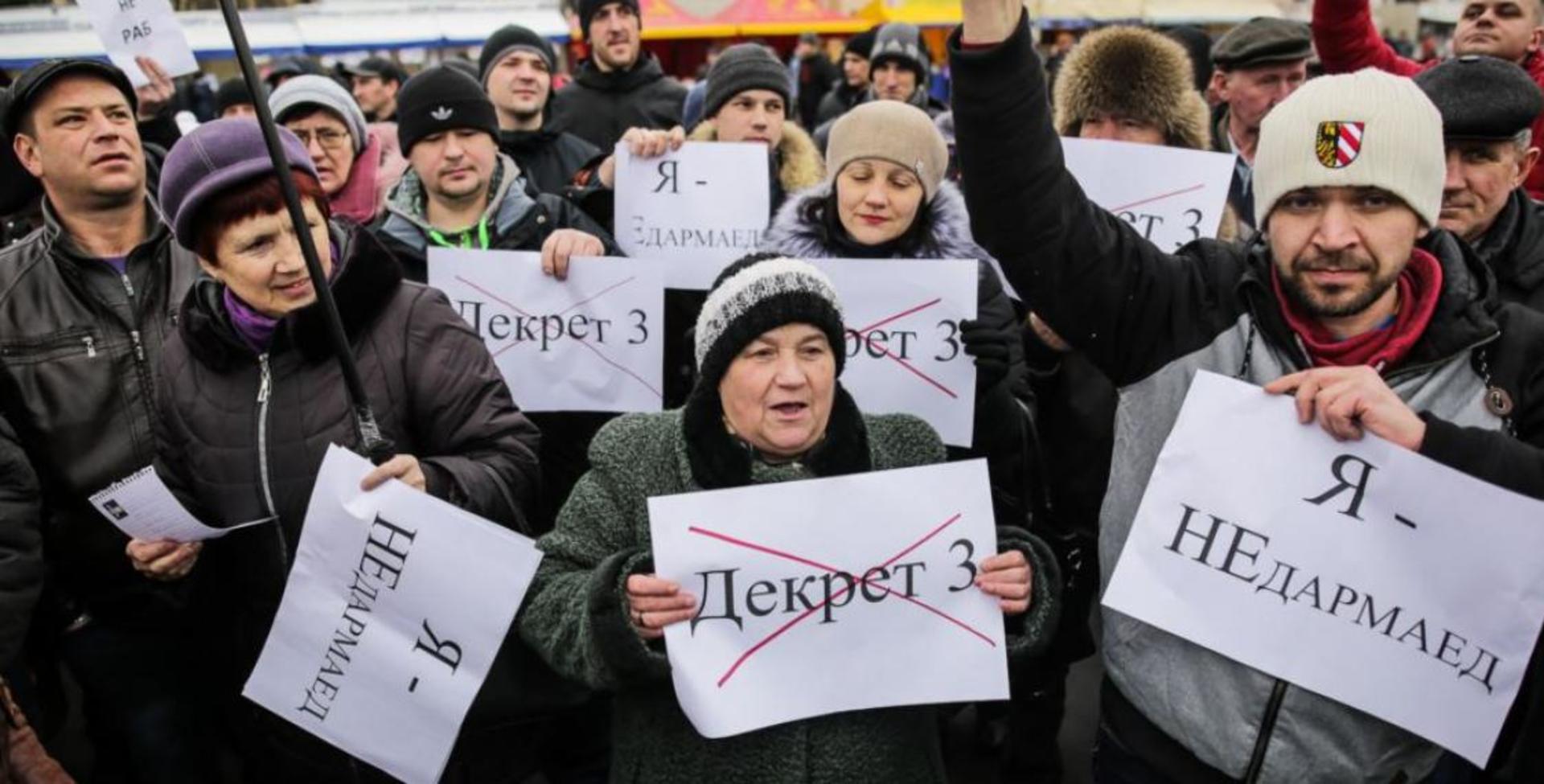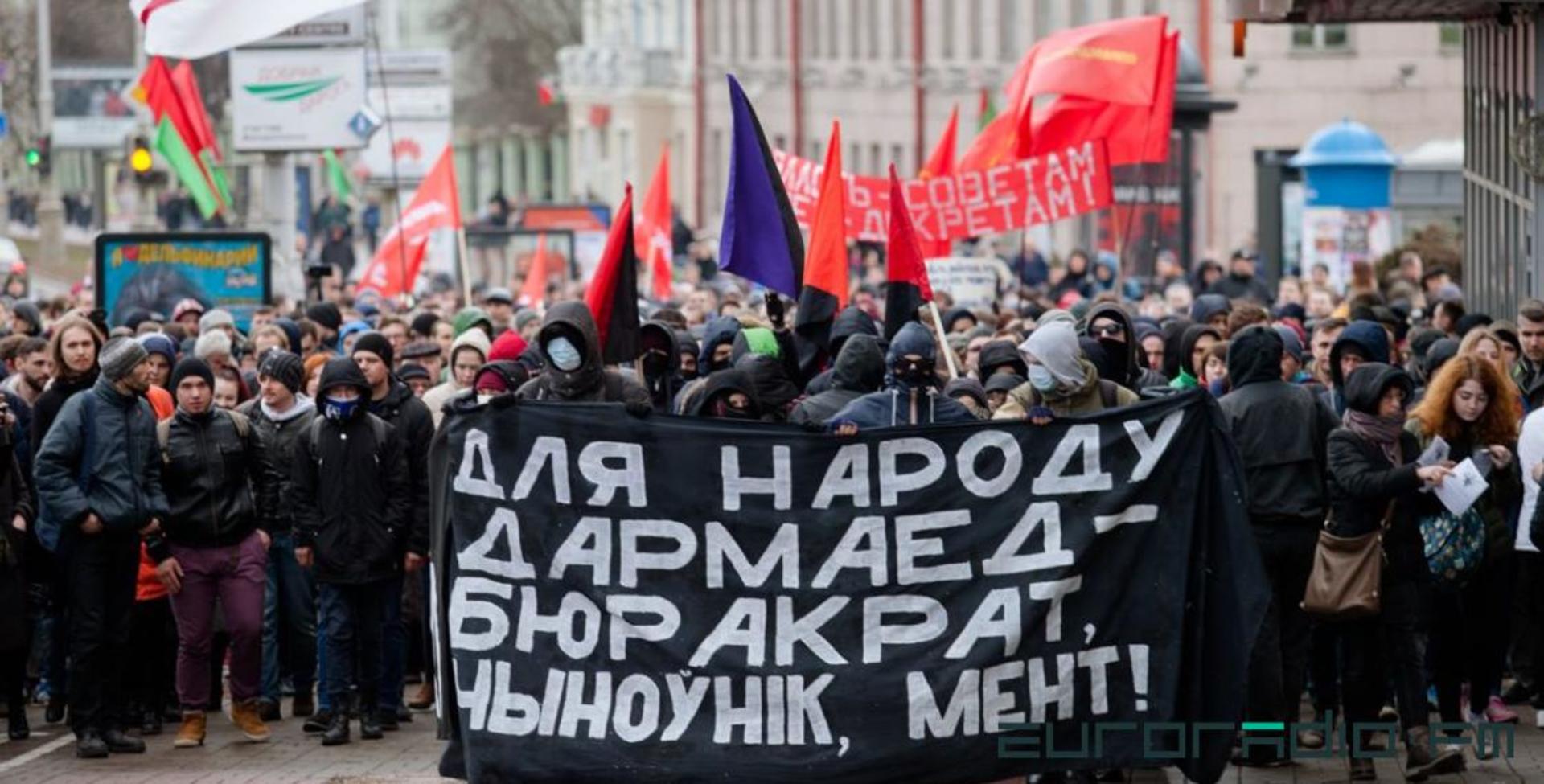Things to know about Belarus protests
Protest rallies have been underway in Belarus for over a month. Those have been the most large-scale rallies since 2010, when people opposed the results of the presidential election. Police dispersed the protesters in Minsk. Opposition leaders, Mikóla (Mikalái) Statkévich and Andréi Sánnikov were arrested, while the EU and USA imposed sanction against Belarusian regime.
The situation is different now. Decree #3 or the so-called ‘social parasite law’ has triggered the rallies. Popular rallies are organized in many cities throughout the country. The most large-scale one is scheduled for March 25. Hromadske media outlet has tried to figure out, what’s going on and answer the key questions.
What do people oppose?
The immediate occasion for launching the protests was the presidential Decree #3 ‘On the Prevention of Social Encumbrance’, which provides for levying a tax on people not in full-time employment. ‘A ‘social parasite tax’, that’s how this levy has been popularly referred to, shall be imposed on a citizen who hasn’t participated in ‘financing the state expenditures’ for over 6 months. Belarus President, Alexander Lukashenko, signed the document back in spring 2015, but the deadline for paying 2015 tax expired on February 20, 2017.
The idea of this resonant document is to make it incumbent upon the able-bodied citizens either to pay to treasury or to get a job. The opposition considers such an approach as unconstitutional.

What slogans are voiced?
Apart from the demand to annul the decree, some more radical slogans could be also heard: ‘Lukashenko, go away!’; ‘Lukashenko, when will you finally burst?’; ‘You screwed us’; ‘No to dictatorship’; ‘Down with toadies’; ‘Lukashenko should resign’; ‘Long live Belarus!’ People are protesting against unemployment, low salaries and price hikes.
In which cities were the rallies held and how large-scale they were?
All large cities of Belarus were overwhelmed with protests. Protest rallies were organized in Minsk, Grodno, Gomel, Vitebsk Mogilyev, Brest and in smaller cities, like Orsha, Molodechno, Bobruysk, Baranovichi etc.
However, not all the rallies were sanctioned: for example, March 15 protest marches in Grodno and Mogilyev were not authorized by the government, while Minsk protest rally was approved.
From several hundred to several thousand people join the street protest. Up to 5,000 people participated in the protest rally in Minsk on February 17. It has been the most large-scale protest rally since 2010.
Whom does the decree apply?
470,000 out of the total 5,5million able-bodied citizens, i.e. 85% of the population, received the so-called ‘letters of happiness’.
About 11% of that number (470,000) paid the tax.
Documents on the need to pay tax was sent to many of those, who either shouldn’t pay this tax at all or can’t pay it due to poor financial condition. Alexander Lukashenko blame his administration and country’s government for this situation and called on local authorities to deal with each particular case.
Students, clergymen, incapacitated individuals, people with disabilities, underage, women above 55 and men above 60, have been exempt from tax. Those, who raise children under the age of 7 (if a child doesn’t attend kindergarten), parents of children with disabilities, as well as those who have 3 or more underage children, shouldn’t be regarded as ‘social parasites’ either.
If a person fails to pay a tax, he/she will be imposed a fine or be arrested for at least 15 days. A citizen will be compelled to engage in mandatory community service.
Who hits the street?
Local NGOs note that the protest rallies bring together those, who have never been involved in political activity.
For example, Zmicier Lukasuk, the Euroradio reporter, told Hromadske as follows: The retired elderly women, who have always been Lukashenko’s electorate, take to the street.”

Which opposition groups are involved?
Belarusian anarchists took the initiative during the March 15 rally. The participants of this very movement were arrested by the local law-enforcers after the rally.
In addition, the United Civic Party (UCP), ‘Belarus Christian Democracy (BCD)’ and ‘For the Freedom’ movement, were also engaged in organizing this rally.
However, the leaders of the aforesaid organizations -Anatoly Lebedko, Vitaly Rimashevskiy and Yuri Gubarevich, were arrested during the rally in Molodechno, on March 10. So, they won’t be able to participate in March 25 rally.
Does the protest have its leaders?
Mikóla Statkévich, former presidential candidate and political prisoner, declared himself a leader of the protest against Decree #3. He undertook to organize March 25 rally, which is going to be the most large-scale one. Personally for him, participation in the protest rallies is fraught with possible arrest.
How do militia react?
The first February rallies passed without any arrests and almost with no interference on part of the law-enforcers, and that despite the fact that not all the rallies were sanctioned by the authorities. However, the non-parasites’ activity didn’t subside and the militia’s pressure intensified.
Tatyana Severinets, an activist, was arrested after the protest rally in Vitebsk, on February 26. 2 participants in an unsanctioned protest rally in Brest were also arrested later.
The United Civic Party and Belarus Christian Democratic Party leaders were arrested by the law-enforcers following the protest rally in Molodechno, on March 11.
According to the ‘Spring’ human rights advocacy center and the FIDH (Federation for Human Rights) organization, overall 200 people were arrested for participation in protests in Belarus as of March 17.
A video was released on social media immediately after March 15 rallies, featuring individuals in civvies arresting the protestors after the rally. In one case, the law-enforcers in civvies even blocked the trolleybus to arrest the rally participants.
On March 21, Lukashenka reported about the arrest of ‘several dozens of militants’, who allegedly prepared provocations in the territory of Belarus.According to the President, the arrestees were ‘trained in the camps’ in Belarus, Ukraine, Poland and Lithuania.
In his words, 20 more people were also arrested, including ex-leader of the White Legion organization, that ceased to exist back in 2006, as well as the members of the ‘Patriot’ club, officially registered with Bobruisk Municipal Executive Committee. Belarusian state TV channels showed the KGB smashing the doors in the arrestees’ apartments. As reported, firearms were found at their place. However, social media users suspected that those firearms were not real.
Government’s position
Alexander Lukashenko postponed introduction of Decree #3. Belarusians will not have to pay a controversial fee in 2017. However, as he pointed out during his public address, the concessions were not made due to the street pressure, but rather because the government realized its mistakes. In addition, the President claimed that Decree #3 wasn’t an economic one (the government is unlikely to get much funds), but rather ‘moral and ideological’.
Lukashenko termed the protest rally organizers as the ‘fifth column’ and suggested that they should be ‘pulled out like raisins from the bun’.



















